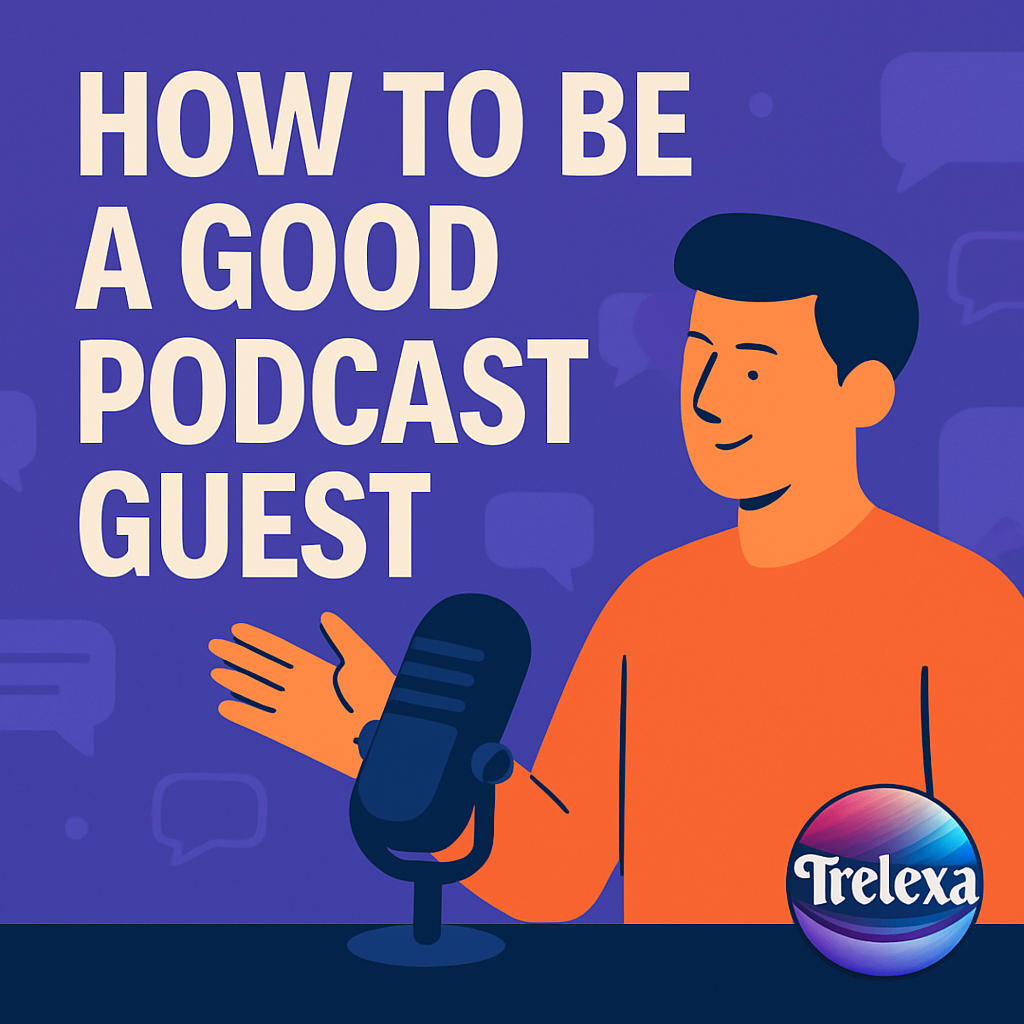Landing a podcast interview is easy.
Making it count? That’s something else entirely.
Too many guests show up thinking it’s their moment to pitch. The best ones treat it like a conversation — not a commercial. They focus less on selling and more on showing up with something worth saying.
This blog is about how to be useful.
If you want to leave a strong impression, earn trust, and actually build authority through podcasting, you’ve got to be the kind of guest people want to hear from and talk about afterward.
Let’s break down what that looks like.
Why podcasts are one of the best authority-building platforms today
It’s not about going viral. It’s about being remembered.
Listeners are more focused and more invested
Podcast audiences choose to tune in. They’re not scrolling past your voice like they do with social posts.
They’re listening while driving, walking, or working — and that attention creates room for real connection.
You get more time to actually say something
A blog might give you 30 seconds of skimming. A tweet gets half that. But on a podcast, you often have 20, 30, even 60 minutes to talk through an idea, share your story, or explain something that matters.
That kind of long-form exposure builds trust.
It builds SEO, credibility, and discoverability
Podcast episodes get indexed. Show notes, transcriptions, backlinks — they all stick around.
So even if the episode aired months ago, people can still find you when searching for your expertise. It becomes part of your digital footprint in the best way.
How to Be a Good Podcast Guest: The mindset
It starts before the mic turns on.

You’re there to serve, not sell
Hosts invite you on to bring value to their audience — not to hear your pitch. The best guests come in with the goal of being helpful.
They offer insights, stories, and practical takeaways that actually stick with listeners. Selling happens later, naturally — if you’ve earned the trust.
Your job is to make the host’s job easier
When you listen well, answer directly, and respect the flow of the conversation, you instantly stand out.
Rambling, interrupting, or hijacking the show with rehearsed talking points? That’s how you end up on the do-not-rebook list.
It’s less about sounding smart and more about being real
Trying to impress people usually backfires. But if you can show up with clarity, curiosity, and a little humility, people listen.
Audiences connect with honesty, not polish. Real > rehearsed.
Preparing like a pro: what to do before the interview
Good guests don’t wing it. They walk in ready.
Know the show before you speak on it
Listen to at least one full episode. Get a feel for the host’s style, the pacing, and the type of questions they ask.
If you’re walking in cold, it shows — and it doesn’t reflect well.
Bring 2–3 points you actually want to land
Don’t write a script. Instead, think in themes. What are two or three key ideas or stories you want to weave in?
They should connect with the show’s audience and feel natural — not forced.
Prep your audio like it matters (because it does)
Even if it’s a casual podcast, bad sound kills your credibility. Use a decent mic, test your internet, find a quiet space, and turn off notifications.
It’s not about having a studio — it’s about showing you care enough to sound presentable.
Be ready, but don’t over-rehearse
Memorized answers are easy to spot. Jot down notes if you need to, but trust yourself to talk like a human.
You’re there for a conversation, not a performance.
During the interview: how to stay sharp, real, and engaging
This is where good prep meets good presence.
Let the host lead — you’re a guest, not a co-host
Jumping in too fast or trying to steer the conversation can throw off the flow. Listen. Respond. Then build.
A great guest adds to the rhythm — they don’t disrupt it.
Answer the question, then go one layer deeper
Don’t just skim the surface. If a host asks you something simple, use it as a chance to offer an insight, example, or personal story. That’s what makes a good answer stick.
Keep it tight, clear, and conversational
This isn’t a lecture. No one’s here for a 7-minute monologue.
Break your thoughts into digestible pieces. Pause. Let the host jump in. Think conversation, not keynote.
Drop the jargon — seriously
If you need to explain something complex, do it in plain English. Listeners want clarity, not corporate buzzwords.
You’ll sound smarter when you’re easy to understand.
Stay present, even toward the end
Don’t coast through the final minutes. Some of the most impactful moments happen late in the episode — if you’re still showing up fully.
Common mistakes podcast guests make (and how to avoid them)
Even smart guests slip up. These are the habits that kill momentum — and how to stay clear of them.
Turning the episode into a sales pitch
If you treat the interview like an ad, people may tune out. Nobody’s listening to be sold to. They’re here for value.
Focus on sharing real insights — the interest in your offer comes naturally if you’re actually helpful.
Giving vague, fluffy answers
General advice doesn’t land. If your answers sound like they could’ve come from a LinkedIn post, go deeper.
Be specific. Share context. Give the kind of answer that makes someone stop and take notes.
Rambling with no real point
Losing the thread of your own thought is an easy trap. Especially if you’re excited.
Stick to one idea at a time. Wrap it up clean. Give the host space to steer the conversation.
Showing up without doing your homework
When it’s clear you don’t know the host’s name, style, or past episodes, it reflects poorly. It says you’re here for airtime and not the actual conversation.
Forgetting who the audience is
Your message needs to match the people listening. A business show isn’t the place for lifestyle tangents.
A mental health podcast doesn’t need startup war stories. Know who you’re speaking to.
What to do after the interview airs
The mic might be off, but your job isn’t done.
Share it, but do it with intention
Don’t just drop a link. Frame the episode. Pull out a quote or insight. Tag the host. Add context so your audience knows why it’s worth their time.
One good episode can fuel a week’s worth of content. By all means, use it.
Thank the host, publicly and privately
A quick DM is fine, but a public thank-you post goes further. It’s a sign of respect and a signal to other hosts that you’re someone worth having on.
Watch how the audience responds
Check comments, DMs, or even episode replies. If someone reaches out, respond.
Keep the conversation going — this is how relationships (and future invites) are built.
Repurpose the conversation into other formats
That story you told? That quote that landed? Turn them into a LinkedIn post, a blog intro, or a Reel. You already said something smart — make sure it keeps working for you.
How Trelexa helps experts become unforgettable podcast guests
Not everyone has time to pitch shows, prep for interviews, and still run their business. That’s where Trelexa comes in.
We help authors, entrepreneurs, and professionals land interviews on podcasts that actually matter — not just any show, but the right show for your niche, your audience, and your goals.
And we don’t stop there. Our team helps you prep like a pro, craft your story, and show up ready to deliver value — not fluff.
Whether you’re trying to build your personal brand, launch a book, or position yourself as a thought leader, we’re here to make sure your voice gets heard and remembered.
Final thoughts
A good podcast guest doesn’t just show up — they leave something behind.
Not in the form of a pitch or a polished performance, but in the form of a moment that sticks.
A story. A phrase. A fresh way of thinking. That’s what makes people remember your name, look you up, and reach out.
If you’re serious about building real authority, this is one of the smartest places to start. And if you’re going to do it — do it well.

